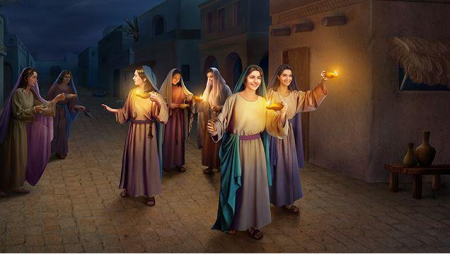The Minas, part one
Luke 19:11–19
But as they heard these things, He added and told a parable, for He was near to Jerusalem, and they thought that the kingdom of God was going to appear immediately. He said therefore, A certain noble man went into a distant country, to receive for himself a kingdom, and to return. And he called his own ten servants, and gave them ten minas7 and said to them, “Do business till I come.”
But his citizens hated him, and sent an embassy after him, saying, “We are not willing that this man should reign over us.”
And it came to pass that when he had come back, having received the kingdom, he also said that these servants should be called to him, to whom he had given the silver, that he might know what everyone had gained by doing business. And the first came, saying, “Lord, thy mina has earned ten minas.” And he said to him, “Well done, thou good servant; because thou hast been faithful in the least, have thou authority over ten cities.”
And the second came, saying, “Lord, thy mina has made five minas.” And he said to him also, “Be thou also over five cities.”
AE 675:7. “Ten” signifies all persons and all things, and “five” some persons and some things. “The ten servants” whom the nobleman going into a far country called to him, mean all who are in the world, and in particular, all who are of the church. For the “nobleman” means the Lord, and “going into a far country” means the Lord’s departure out of the world and His then seeming to be absent. “The ten minas that he gave to the ten servants to trade with” signify all the knowledges of truth and good from the Word, with the ability to perceive them. For a mina, which was silver and was money, signifies the knowledges of truth and the ability to perceive; and “to trade” signifies by means of these [knowledges] to acquire intelligence and wisdom. Those who acquire much are meant by the servant who from a mina gained ten minas; and those who acquire some are meant by him who from a mina gained five minas. The “cities” which are said to be “given to them” signify the truths of doctrine, and “to possess them” signifies intelligence and wisdom, and life and happiness from them.
Being good stewards of our Master’s goods
DP 210. Unless it appeared to man that he lived as from himself and thus that he thought and willed, spoke and acted as of himself, he would not be man. From this it follows that if man, as from his own prudence, did not dispose all things pertaining to his function and life, he could not be led and disposed from the Divine Providence. For he would be like one standing with his hands hanging down, his mouth open, his eyes closed and holding his breath, awaiting influx. He would thus divest himself of the human, which he has from the perception and sensation that he lives, thinks, wills, speaks and acts as from himself. And at the same time, he would divest himself of his two faculties, liberty and rationality, by which he is distinguished from the beasts.... Without this appearance a man would not have the power to receive and to respond, and thus would not have immortality.
DP 210:2. Therefore, if you wish to be led by the Divine Providence, use prudence as a servant and steward does who faithfully dispenses the goods of his master. This prudence is the talent that was given to the servants to trade with, of which they must render an account (Luke 19:13–25; Matt. 25:14–31).
Prudence itself appears to man as his own; and it is believed to be his own so long as he keeps shut up within him the deadliest enemy of God and the Divine Providence, the love of self. This dwells in the interiors of every man from birth. If you do not recognize it—for it does not wish to be recognized—it dwells securely, and guards the door lest man should open it, and it should thus be cast out by the Lord. Man opens this door by shunning, as of himself, evils as sins, with the acknowledgment that he does so from the Lord. This is the prudence with which the Divine Providence acts as one.
7 A mina was a monetary weight in silver equal to 100 drachmas or denarii, about one and a quarter pounds. The word is related to “Mene, Mene,” written on the wall of Belshazzar’s palace, meaning “counted” (Daniel 5:25, 26).
Questions and Comments
- “They thought that the kingdom of God was going to appear immediately.” Do we think this way when we feel angry at God or doubtful of His providence when we see injustices and hardships in this world?
- How does the part about the citizens hating him fit into this parable? See also the end of this parable on page 18.
- Doing business has a very good correspondence in this parable and the parable of the talents. The Lord gives us knowledges of truth and the ability to perceive them. Then we can apply them to life and so acquire intelligence and wisdom, life and happiness. Do you know of businesses that operate with integrity like this?
- Do you sometimes wish you could just let your hands hang down and wait for influx? At such a time, perhaps we can think of Joseph in Potiphar’s house, and in the prison, and caring for Egypt, and aim to be a good steward following his example.
| previous |  |
next |
|---|


